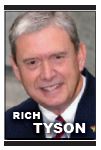Richard Tyson
About 2500 years ago, a man by the name of Haggai gave three powerful words of advice to his friends and neighbors: “Consider your ways.”
As we embark on a new year, I find myself pondering those three words. For many of us, this is a time of making New Year’s resolutions. In doing so, we are inherently “considering our ways.” We may have significant concerns to address in terms of health, education,{mprestriction ids="1,3"} how we interact with one another or any of a multitude of other things. If there is a time of year for setting new goals — and resolving to achieve them — this is it!
Even so, experts warn us that most New Year’s resolutions fall apart quickly. “Why?,” we must ask. I believe it is because of two fundamental reasons:
1. We don’t put enough effort into considering our ways, and …
2. We fail to fully assess and understand the costs we must pay to achieve the changes we desire.
Regarding the first of these, considering our ways should include a clear answer to the question, “What are the priorities in our lives, in our relationships, in our businesses, or in our careers?” Then, two follow-on questions are simple, but powerful: “Am I investing my time and efforts consistently in pursuit of those priorities?” And, if not, “What do I need to change?”
Answering these questions thoughtfully will help us be “all in” in setting our resolutions. However, this only gets us started in being a wise and successful resolution-setter. We must now determine the price to be paid to achieve our goals.
One of the most typical resolutions often made, and then abandoned, is weight loss. While there may be clinical reasons for failure to peel off the pounds, far too often the answer is that we simply don’t have the discipline to consistently pay the price to get the results we desire. Such discipline starts with understanding what is required, and then proceeding to act on that understanding.
When I finished my MBA program at the Harvard Graduate School of Business over four decades ago, I took a month before starting my new job to ponder what I had learned in my two years and thousands of hours of study and coursework. I wanted to distill what I characterized as “drinking at the firehose” into some simple clear principles that I could live by. One of the first of these I summarized in an acronym: PACER– Plan, Act, Control, Evaluate, Revise.
This simple mental model synthesized the process I had learned from hundreds of business school case studies. Virtually every problem, challenge or opportunity we discussed or debated in the classroom brought us to a decision point: What should the CEO or business manager do? And that moved us to develop a plan to be enacted, which would require control, evaluation and revision.
In annually considering my ways over the years since completing my master’s degree, I have modified my use of my PACER model by starting with Evaluation of my performance in comparison to the priorities in my life. I then move to Revising my Plans; I set new resolutions. That process includes counting the costs required for success, defining them as clearly as I possibly can. Then I Act; I go to work. As I do so, I measure and record my actions and compare them to my plans. This is my Control mechanism, my way of maintaining the discipline required to keep my resolution. As I do these things, I can then recycle back to Evaluating my progress.
Because life is inherently messy, I recognize that unforeseen challenges, interruptions and distractions will inevitably arise that will occasionally pull me off track. The key then is to be OK with mid-course corrections as I evaluate myself. I have to revise and recommit.
My PACER action model has served me well over the years and has been the basis for much of the coaching I have done with business leaders. It works as a basic model for strong, successful strategic action, and it has proven to be a real assist for making and keeping resolutions. It’s a simple model made even more powerful when combined with the simple advice from good old Haggai: Consider Your Ways!
I wish you all the best in setting — and keeping — your New Year’s resolutions!
Richard Tyson is the founder, principal owner and president of CEObuilder, which provides forums for consulting and coaching to executives in small businesses.{/mprestriction}








